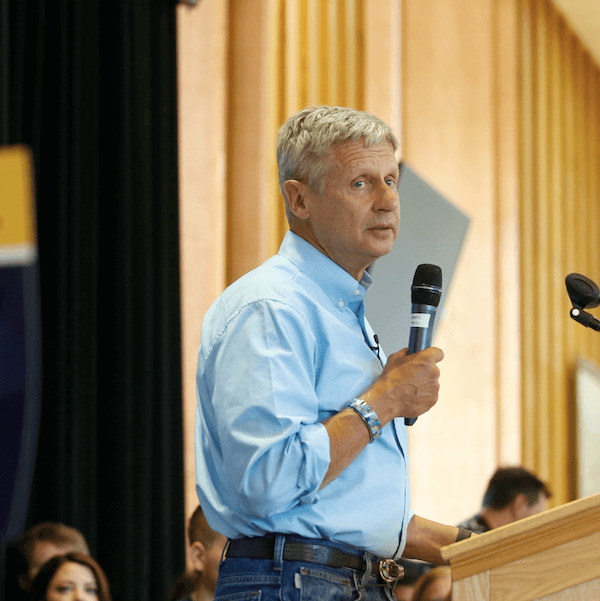The Gary Johnson campaign finance plan asks the government to get out of the way of private donations but to ensure transparency in the process. The Libertarian Party candidate doesn’t think the government should limit the amount of money wealthy individuals and corporations can contribute during elections. But he’s not exactly fond of the influx of big money into politics, and he’s got a plan to discourage the practice.
No limits
Libertarians are into small government, and eliminating regulations wherever they see possible is a typical component of their politics. And Johnson thinks campaign finance regulation is one such area.
During his 2012 presidential bid, he said that Citizens United should be upheld. He spoke in favor of the opinion issued by the majority of judges in that case – that corporations are people, too, and that limiting their political spending is akin to limiting free speech, which is guaranteed under the First Amendment.
There are, however, still limits on how much an individual or entity can contribute directly to a politician. Currently, unlimited spending is only legal when that money goes through a Super PAC, an entity that campaigns for or against a politician but is not allowed to coordinate directly with their campaign.
In fact, Johnson thinks the direct contribution caps for individuals and entities should be lifted, thereby eliminating the need for Super PACs.
Pimp the sponsorship
But Johnson isn’t exactly advocating a contribution free-for-all, even though such would be legal based on his policy proposal. Another crucial component of his campaign finance position is complete transparency; politicians can take however much they’re offered from whomever, but would be required to inform the public of how much they’re getting and from whom.
Currently, Super PACs do have to disclose from where the money they received comes. But there’s a huge loophole: a certain category of Super PAC contributors known as “politically active non-profits” do not have to disclose who contributes to them. Enter “dark money” into politics.
[postquote]
Johnson wants to shine a glaring light on who’s putting money into election cycles and how much. And he seems to think this would discourage politicians from taking a bunch of dough from rich people and corporations. He said in an interview during his 2012 presidential bid:
Make this 100% transparent. I think we should couple it with having to wear jackets with patches similar to race car drivers, the patches being relative to the size of contribution given to the candidates, and let the candidates wear those jackets everywhere they go.
It’s unlikely that Johnson was being literal with the jacket spiel, but the sentiment is clear: Public scrutiny of campaign financing would encourage more reliance on small donations from everyday Americans, and fewer contributions (or at least accepted contributions) from big-money interests.
No public financing, either
Many advocates for campaign finance reform suggest switching to public financing, in which each candidate can receive and spend up to a certain amount from the federal government. Johnson’s not about it.
Part of the reason is covered above: he doesn’t think the government should set limits on campaign contributions. But he elaborated on his reason for resisting the public financing option, and contribution limits in general, in June of this year, telling ProCon.org, “Any sort of public financing empowers incumbency. Any sort of limiting of campaign contributions, any sort of public funding, is just going to give advantage to those who already have a name.”
As a third-party candidate struggling to get his name out there, it’s no surprise that Johnson would favor policy that enables newcomers, or lesser-known politicians, to enter the political arena. He seems to believe that the spending limit imposed by public financing would disadvantage lesser-known candidates, who may need to spend more to make themselves known.
However, research from the Brennan Center (a left-leaning think tank) isn’t quite on his side here. A report from the center compiled a bunch of studies from states with public financing options and found that it decreases the likelihood of an incumbent running unopposed and increases the competitiveness of the races. And, as the Center for Governmental Studies reported, public financing programs are associated with lower re-election rates for incumbents.
Just stay out of it
For his part, Johnson just wants the government to stay out of campaign finance – except insofar as it implements legislation to guarantee transparency. That way, nobody can complain about their free speech rights being violated, but the role of big money in elections could still be reduced.
Have something to add to this story? Comment below or join the discussion on Facebook.
Header image: Getty









































